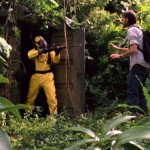 There seems to be a pattern that determines when Locke and the gang are jumping in time on Lost. Whether it’s Richard Alpert telling Locke what to do when he next sees him, or Faraday telling Desmond to find his mother in the future, or Locke telling Alpert to seek him out in a few years once he’s born. So far, the jumps occur whenever a character is talking to another character about events from a different time. Perhaps fate is preventing the characters from knowing something they shouldn’t be privy too or maybe it’s time’s way of course correcting, but I believe there is a deeper reason why the time jumps are happening at that exact moment. And it relates to wisdom we can use in our real lives.
There seems to be a pattern that determines when Locke and the gang are jumping in time on Lost. Whether it’s Richard Alpert telling Locke what to do when he next sees him, or Faraday telling Desmond to find his mother in the future, or Locke telling Alpert to seek him out in a few years once he’s born. So far, the jumps occur whenever a character is talking to another character about events from a different time. Perhaps fate is preventing the characters from knowing something they shouldn’t be privy too or maybe it’s time’s way of course correcting, but I believe there is a deeper reason why the time jumps are happening at that exact moment. And it relates to wisdom we can use in our real lives.
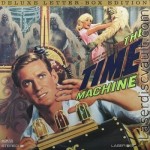
Right from the start of Lost’s fifth season premiere, “Because You Left,” we learn that the island is officially capable of moving through time and space. Time travel has been a theme of Lost since at least Desmond’s mind-flashes during season three, and perhaps as far back as the “Adam and Eve” skeletons of season one. Now however, it has been unequivocally confirmed as a very real, functioning principle within the show’s mythology. Or, has it?
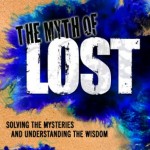
We all know that Lost is filled with lots of hidden clues—everything from the books the characters read and the philosophers their names are based on, to the anagrams, whispers, and backwards-talk found in many episodes. While these hints can help us to understand the show, there is something else woven into its many mysteries that is far more valuable to our everyday lives…
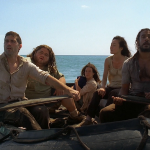 Continuing in the same vein as Part 1, Parts 2&3 was mostly action/adventure and little mythology. And what little there was still seems to support my theory.
Continuing in the same vein as Part 1, Parts 2&3 was mostly action/adventure and little mythology. And what little there was still seems to support my theory.
For starters, at the end of the last episode’s update, I wrote:
In “Something Nice Back Home” Hurley even suggests that none of them made it off the island, and they were, perhaps dead. Not dead, just stuck in limbo between worlds. I feel like the season will end with the five of them not being rescued as we think, but getting hurt, and this whole flash-forward has all been in their minds.
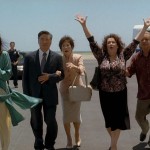 Since the purpose of these season finales is primarily to finally link together the flash-forwards with the story on the island, there’s very little mythology involved. While gripping and fast-paced, it’s really all soap opera stuff. For that reason, there really isn’t much to say about them from a mythological perspective. Except perhaps, that they seem to give further weight to the island having been real and not a simulation after all.
Since the purpose of these season finales is primarily to finally link together the flash-forwards with the story on the island, there’s very little mythology involved. While gripping and fast-paced, it’s really all soap opera stuff. For that reason, there really isn’t much to say about them from a mythological perspective. Except perhaps, that they seem to give further weight to the island having been real and not a simulation after all.
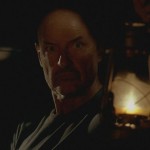 You can always be sure that the Locke-centric episodes will focus more on mythology than action and this episode didn’t disappoint. Between Locke’s creepy dream of Horace Goodspeed, his exploration of Jacob’s cabin, his conversation with Christian Shephard and an eerily entranced Claire, and the flashback scenes hinting at his strange childhood with appearances by an unchanged Richard Alpert, there were more than enough mysteries to keep fans occupied.
You can always be sure that the Locke-centric episodes will focus more on mythology than action and this episode didn’t disappoint. Between Locke’s creepy dream of Horace Goodspeed, his exploration of Jacob’s cabin, his conversation with Christian Shephard and an eerily entranced Claire, and the flashback scenes hinting at his strange childhood with appearances by an unchanged Richard Alpert, there were more than enough mysteries to keep fans occupied.
 This episode had a really good mix of suspense and mystery, closer to Seasons 1 & 2 Lost. Early on in the episode, we get a flash-forward of Jack where he goes to visit Hurley in the Santa Rosa Mental Hospital. Hurley hasn’t been taken his meds because he believes that he and the other Oceanic Six are all dead and that none of them actually made it off the island. Hurley asks Jack about his day and Jack tells him of his life now with Kate and Aaron. Hurley compares Jack’s life with Kate to heaven. Hurley then mentions that he still sees Charlie and talks to him and Charlie had a message for Jack: that he’s “not supposed to raise him,” apparently referring to Aaron. Hurley then tells Jack that he would also be getting a visit from someone soon. That person winds up being Jack’s father, who Jack sees clearly sitting on the couch at the hospital where he works. So are Charlie and Jack’s father still alive? The simulation theory presented in “The Myth of Lost” predicted that they were, but not in the ghostly way that they’ve been appearing on the show.
This episode had a really good mix of suspense and mystery, closer to Seasons 1 & 2 Lost. Early on in the episode, we get a flash-forward of Jack where he goes to visit Hurley in the Santa Rosa Mental Hospital. Hurley hasn’t been taken his meds because he believes that he and the other Oceanic Six are all dead and that none of them actually made it off the island. Hurley asks Jack about his day and Jack tells him of his life now with Kate and Aaron. Hurley compares Jack’s life with Kate to heaven. Hurley then mentions that he still sees Charlie and talks to him and Charlie had a message for Jack: that he’s “not supposed to raise him,” apparently referring to Aaron. Hurley then tells Jack that he would also be getting a visit from someone soon. That person winds up being Jack’s father, who Jack sees clearly sitting on the couch at the hospital where he works. So are Charlie and Jack’s father still alive? The simulation theory presented in “The Myth of Lost” predicted that they were, but not in the ghostly way that they’ve been appearing on the show.
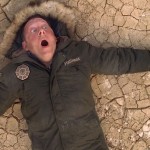 This is the first episode written after the writer’s strike, and to me, it felt like it. The story was rushed, the dialogue seemed out of place for the characters (i.e., Sawyer telling Ben that he’d kill him if he harmed on hair on Hurley’s head—since when does Sawyer care that much about anyone but himself?), and the action was kind of unbelievable at times (Sayid turning his head all the way around to notice Ben photographing him from atop a building behind him). In spite of this, or perhaps because of it, I also found this episode pretty funny.
This is the first episode written after the writer’s strike, and to me, it felt like it. The story was rushed, the dialogue seemed out of place for the characters (i.e., Sawyer telling Ben that he’d kill him if he harmed on hair on Hurley’s head—since when does Sawyer care that much about anyone but himself?), and the action was kind of unbelievable at times (Sayid turning his head all the way around to notice Ben photographing him from atop a building behind him). In spite of this, or perhaps because of it, I also found this episode pretty funny.
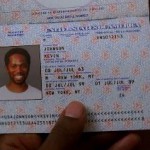 The first thing that stuck me as interesting in this episode was Michael, a.k.a., Kevin Johnson, responding to Sayid’s question about what he was doing there by saying that he was there to die. After watching the full episode, we may assume that he was referring to his repeated attempts at suicide, but if “The Myth of Lost” simulation theory is correct, Michael may be talking about something else—his desire to die and get out of the simulation already.
The first thing that stuck me as interesting in this episode was Michael, a.k.a., Kevin Johnson, responding to Sayid’s question about what he was doing there by saying that he was there to die. After watching the full episode, we may assume that he was referring to his repeated attempts at suicide, but if “The Myth of Lost” simulation theory is correct, Michael may be talking about something else—his desire to die and get out of the simulation already.
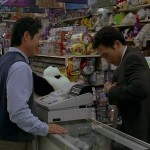 If nothing else, this episode certainly proved that the writers are still at the top of their game, using creative use of flashbacks and flash-forwards to offer an intriguing twist. I also think it gave a lot of weight to “The Myth of Lost” simulation theory, and some of the sub-theories related to it.
If nothing else, this episode certainly proved that the writers are still at the top of their game, using creative use of flashbacks and flash-forwards to offer an intriguing twist. I also think it gave a lot of weight to “The Myth of Lost” simulation theory, and some of the sub-theories related to it.
 There seems to be a pattern that determines when Locke and the gang are jumping in time on Lost. Whether it’s Richard Alpert telling Locke what to do when he next sees him, or Faraday telling Desmond to find his mother in the future, or Locke telling Alpert to seek him out in a few years once he’s born. So far, the jumps occur whenever a character is talking to another character about events from a different time. Perhaps fate is preventing the characters from knowing something they shouldn’t be privy too or maybe it’s time’s way of course correcting, but I believe there is a deeper reason why the time jumps are happening at that exact moment. And it relates to wisdom we can use in our real lives.
There seems to be a pattern that determines when Locke and the gang are jumping in time on Lost. Whether it’s Richard Alpert telling Locke what to do when he next sees him, or Faraday telling Desmond to find his mother in the future, or Locke telling Alpert to seek him out in a few years once he’s born. So far, the jumps occur whenever a character is talking to another character about events from a different time. Perhaps fate is preventing the characters from knowing something they shouldn’t be privy too or maybe it’s time’s way of course correcting, but I believe there is a deeper reason why the time jumps are happening at that exact moment. And it relates to wisdom we can use in our real lives.









